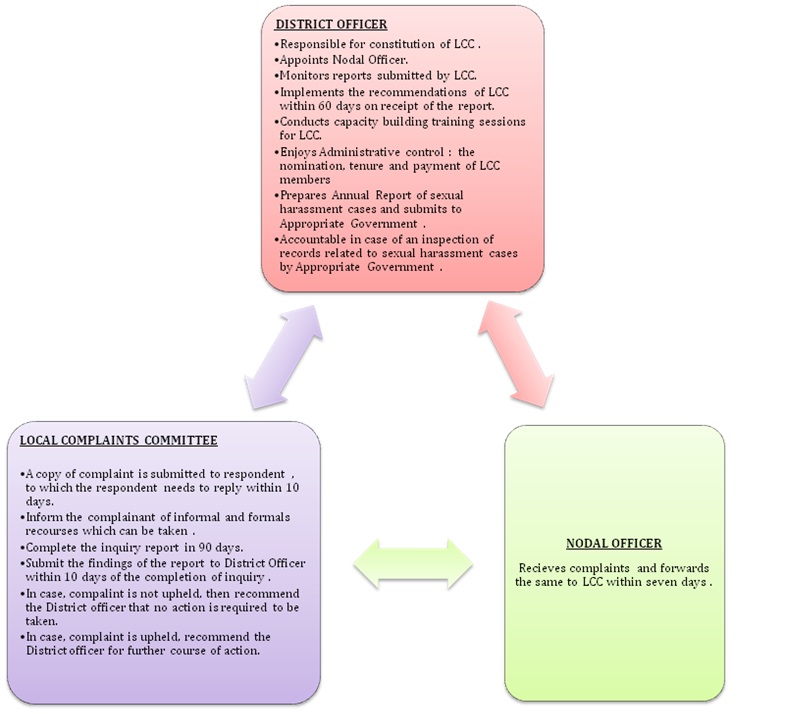How can POSH Act, 2013 be implemented effectively at the ground level: an analysis

In 2013, the Government of India notified the Sexual Harassment of Women at Workplace (Prevention, Prohibition and Redressal) Act (“POSH Act”). The Act aspires to ensure women’s right to workplace equality, free from sexual harassment and in practice setting up a mechanism which:
- prohibits unwelcome behaviour that constitutes workplace sexual harassment;
- champions prevention of workplace sexual harassment through orientation, awareness and sensitization sessions; and
- provides a detailed framework for redressal.
Thus today, all workplaces in India are mandated by law to provide a safe and secure working environment free from sexual harassment for all women. It is important to note here that the needs and structure of every work place differs. A broad categorization of the workplaces on basis of the organizational structure is – organized and unorganized sector. To suit to its peculiar challenges the grievance redressal machinery is slightly different for both the sectors. In organized sector, the Employer and Internal Complaints Committee are needed for an efficient implementation of the POSH Act. The grievance redressal mechanism to achieve this objective in Unorganized Sector is structured in such a way that it is important for different authorities to work in tandem with each other to implement the act effectively. The main authorities are namely: District Officer, Local Complaints Committee and Nodal Officer.
According to provisions of the POSH Act, the following initial steps are needed to set up a grievance redressal mechanism for sexual harassment cases:
- The appropriate Government notifies a District Magistrate or Additional District Magistrate or the Collector or Deputy Collector as a District Officer for every District to exercise powers or discharge functions under this Act.
- The District Officer, in the district concerned constitutes a committee to receive complaints of sexual harassment from establishments where the Internal Complaints Committee has not been instituted due to having less than ten workers or if the complaint is against the employer himself. This committee is called Local Complaints Committee or LCC. It receives complaints from domestic workers also.
- The District Officer designates one nodal officer in every block, taluka and tchsil in rural or tribal area and ward or municipality in the urban area, to receive complaints and forward the same to the concerned Local Complaints Committee within a period of seven days.
- The District Officer monitors the timely submission of reports furnished by the Local Complaints Committee.
Thus it is clear from their respective roles that either of the authorities cannot work in isolation. There is a link established in both objective of the constitution of these institutions and their working. For example, if the District officer will falter in his role, the LCC will never come in existence; or if there will not be any appointment of Nodal Officer, the complaints will never reach the LCC only; or if Nodal Officer and LCC do not work according to the provisions of the Act, the complaints will not be addressed properly in lack of a monitoring role of the District Officer.
Through an effective implementation of the Act, where every authority plays its role in consonance to the other authority, the preventive benefit will be threefold:
- It will ensure a place where women workers can get redress.
- It will send a clear message to the general public and women in particular that a specially designated committee with external expertise will enquire into complaints.
- Prevent a series of expensive and time consuming litigation.

Preventive Guidelines and Suggestive Measures to that effect
Prevention lies at the core of this POSH Act, whereby there are specific duties that have been put on the employer to ensure that there is increased awareness about the problem of sexual harassment, and the consequences that can ensue owing to the presence of the POSH Act. Due to lack of structure and undefined employer- employee relationship in most of the workplaces (mainly unorganized sector) in India, it is difficult to assign accountability to the employer. Therefore, for such situations, it is the duty of the District Officer to take such measures as may be necessary for engaging non – governmental organizations for creation of awareness on sexual harassment and the rights of the women. In lack of awareness about the existence of such a law, many women suffer sexual harassment silently or are a forced to take recourse through much complicated and expensive criminal law provisions. Thus for effective implementation of the Act on grass- root level, it is important that women are aware of the mechanism put in place for redressal of sexual harassment cases. Some suggestive measures for the same are as follows:
- The POSH Act makes the District Officer responsible for implementing preventive guidelines. But it is equally important for LCC and Nodal Officer to not just be a part of the redressal machinery but also the preventive measures.
- The LCC needs to make women aware about LCC members and their contact details, so that women can file complaints without any hassle.
- The first person an aggrieved woman approaches for filing a complaint is Nodal Officer. If the Nodal Officer at that time only informs the woman of the procedure that will be taken for redressal , it will help her make an informed choice if she wants to settle the matter in an informal way ( warning the respondent or concillation ) or opt for the formal route given in the Act.
- Currently, under the law, it is the duty of District Officer that the members of the complaints committee are trained. A Nodal Officer is the link between the complainant and the LCC and thus it is important that he should also be involved in the capacity building and training sessions organized for LCC.
Author: This post has been submitted by Prerna Seerwani, as part of her assignment with Ungender Insights. Prerna Seerwani is currently a student of NALSAR University of Law, Hyderabad.
Read our insights about diversity, legal updates and industry knowledge on workplace inclusion at Ungender Insights. Visit our Blog.
Sign up to stay up-to-date with our free e-mail newsletter.
The above insights are a product of our learning from our advisory work at Ungender. Our Team specialises in advising workplaces on gender centric laws.
or email us at contact@ungender.in





